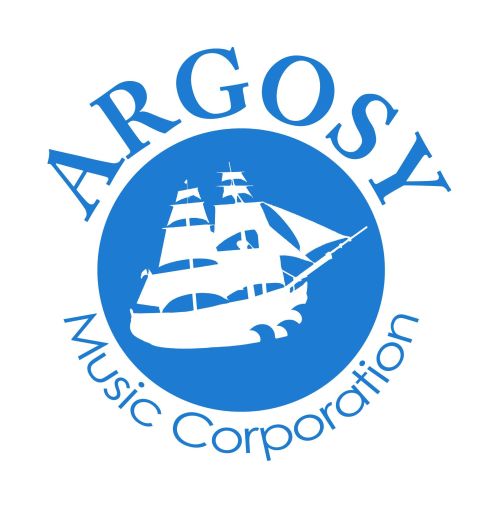
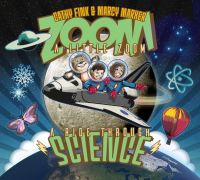
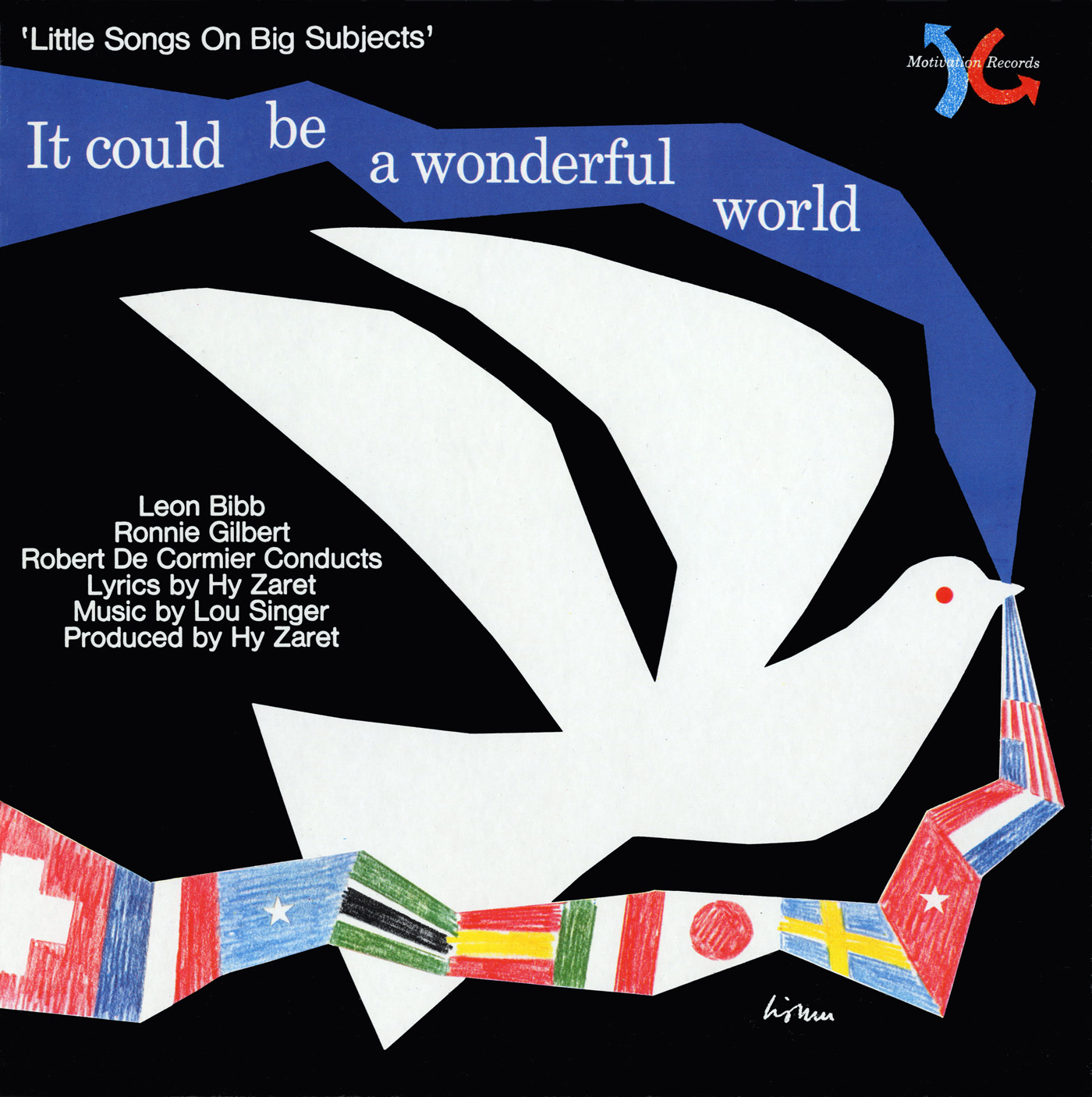
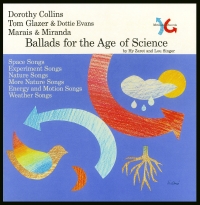
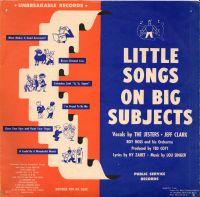
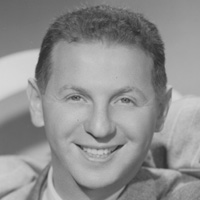
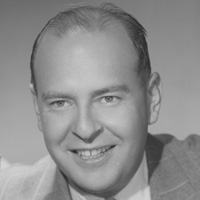
Truly this is "public service." It is also the highest form of American patriotism. My own hat is off to Mr. Zaret and Mr. Singer. Long may they wave! Little Songs on Big Subjects is the Bill of Rights set to music. Lets's have more and more of this kind of warm, human, high-hearted work on the radio. The hatred, malice, and uncharitableness of racial prejudice will wither before it!
I have heard all of your Little Songs on Big Subjects and my wish is that they all grow to become very big songs. They cannot be sung too loud or too often to suit me. The more who hear them, the more who sing them, the more who believe them, the nearer we shall get to peace and happiness on earth.
Some of the best songs on Democracy we have heard. They have the simple, direct quality of folk songs. Excellent material for class or club programs.
These brief songs - a cross between nursery rhymes and singing commercials - hit home like a sledge hammer.
Catchy tunes boost tolerance.
A refreshing and distinct new treatment of radio public service programming, that is not only highly entertaining but posseses plenty of impact.
Little Songs on Big Subjects is a suite of one-minute jingles designed to promulgate the moral excellence of tolerance and fair play, and to instill awareness of true Americanism.
Actually, WNEW has transformed singing commercials into folksong vignettes with an up to-the-minute flair, and Presto! You have ideal primers for democracy.
How a little jingle can have a mighty punch is perfectly illustrated in Little Songs on Big Subjects, a series of musical jingles which WNEW, N.Y., commissioned to preach the virtues of tolerance, fair play and Americanism.
Series are as smart a combination of showmanship, salesmanship, artistry and propaganda as one would wish. It's public service with a flair.
Dished up tastefully in lyric, song and production, as tunes rather than preachment, the jingles appeal to the ear as well as to mind and heart. They're a tribute to a smart station and the combined minds that conceived them. There's a professional air about these spots. They have a conciseness and body that make them hit hard and fast in their one-minute span for a solid impact. ... What all this amounts to is, WNEW has turned singing commercials into folk songs and has come up with the ideal primers for democracy. More wattage to it.
Democracy and tolerance jingles were previewed in advance of their debut tonight at last fortnight's Institute for Education by Radio at Ohio State University, where they were cheered by hard-boiled radio men and crusty educators as well. Upwards of 200 stations throughout the country promptly booked the series, to be aired as soon as the transcriptions can be delivered.
Little Songs On Big Subjcts are the most exciting things I have heard in years. What's more, they are news - good news. These Little Songs combine the speed and concentration of a singing commercial with the immediate charm of a nursery rhyme. But, instead of selling soap or soup, they sell racial understanding, religious freedom, personal tolerance, simple brotherhood, and world-wide understanding.
The music is straightorward and gay and the words are as simple as a folk song. The communication can be enjoyed on any level. The child in the nursery will love it for the mere sound of the words and music, apart from any meaning. The somewhat older child will begin to realize the implications of the "message". The adult - parent, teacher, or merely neutral listener - will appreciate the full impact, as well as the deep overtones which linger in the mind long after the "Little Song" is over.
The experts who fashioned these miniature musical messages are Hy Zaret and Lou Singer, whose creations range from the ever popular "One Meatball" and "The Lass with the Delicate Air" to the legend-parable "Patrick Henry and the Frigate's Keel," now included in Decca's Salute to the Freedom Train.
Little Songs on Big Subjects, the latest creative effort of Hy Zaret and Lou Singer, are inspired bits of imagination in which the tunes are easily remembered and the meaning becomes increasingly memorable. They offer a perfect combination of entertainment and education, and, I believe, are destined to become American classics. They are the Mother Goose songs of Democracy.
 American Veterans Committee Democracy Award 1948 presented to WNEW
"in recognition of outstanding achievement through the medium of advertising
in the furtherance of 'a more democratic and prosperous America and a more stable world.'"
American Veterans Committee Democracy Award 1948 presented to WNEW
"in recognition of outstanding achievement through the medium of advertising
in the furtherance of 'a more democratic and prosperous America and a more stable world.'"
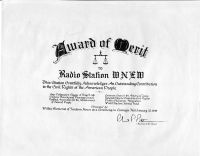 Anti-Defamation League, Citizens Housing and Planning Council, National Association
for the Advancement of Colored People, Common Council for American Unity, National
Citizens Council on Civil Rights, Public Education Association, and World Student
Service Fund 1949 Award of Merit to WNEW for "an outstanding contribution to the
civil rights of the American people. Presented by the Willkie Memorial of Freedom House in Carnegie Hall."
Anti-Defamation League, Citizens Housing and Planning Council, National Association
for the Advancement of Colored People, Common Council for American Unity, National
Citizens Council on Civil Rights, Public Education Association, and World Student
Service Fund 1949 Award of Merit to WNEW for "an outstanding contribution to the
civil rights of the American people. Presented by the Willkie Memorial of Freedom House in Carnegie Hall."
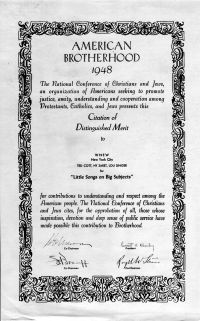 The National Conference of Christians & Jews 1948 to WNEW, Ted Cott, Hy Zaret,
and Lou Singer Citation of Distinguished Merit for "contributing to understanding
and respect among the American people."
The National Conference of Christians & Jews 1948 to WNEW, Ted Cott, Hy Zaret,
and Lou Singer Citation of Distinguished Merit for "contributing to understanding
and respect among the American people."
 Good Neighbor Lodge & Chapter of B'nai B'rith 1949 citation to Hy Zaret and
Lou Singer "in recognition of the invaluable contribution made by their
Little Songs on Big Subjects to our American democratic tradition.
Through the media of radio, records and personal appearance they have fought
the good fight against bigotry and ignorance. With song and lyric they have promoted
understanding, good will and brotherly love. Their tunes and ditties have made men
of all colors, creeds and races their debtors."
Good Neighbor Lodge & Chapter of B'nai B'rith 1949 citation to Hy Zaret and
Lou Singer "in recognition of the invaluable contribution made by their
Little Songs on Big Subjects to our American democratic tradition.
Through the media of radio, records and personal appearance they have fought
the good fight against bigotry and ignorance. With song and lyric they have promoted
understanding, good will and brotherly love. Their tunes and ditties have made men
of all colors, creeds and races their debtors."
 The Radio-Television Critics Circle Annual Statement in 1948
"In times that cry for a fight on tolerance, Station WNEW is to be praised for
its 'little songs on big subjects,' the jingles which have spread their message
of goodwill to 616 stations through the U.S., produced by WNEW's vice president,
Ted Cott, written by Hy Zaret, set to music by Lou Singer, and distributed by
the Institute for Democratic Education, the jingles represent a successful formula
adapted to a vital cause. Thus, WNEW has raised the stature of radio and served a
reminder that America is basically a country where to be different is to be American.
In the words of one of the 'little songs': I'm proud to be me, but I also see
you're just as proud to be you."
The Radio-Television Critics Circle Annual Statement in 1948
"In times that cry for a fight on tolerance, Station WNEW is to be praised for
its 'little songs on big subjects,' the jingles which have spread their message
of goodwill to 616 stations through the U.S., produced by WNEW's vice president,
Ted Cott, written by Hy Zaret, set to music by Lou Singer, and distributed by
the Institute for Democratic Education, the jingles represent a successful formula
adapted to a vital cause. Thus, WNEW has raised the stature of radio and served a
reminder that America is basically a country where to be different is to be American.
In the words of one of the 'little songs': I'm proud to be me, but I also see
you're just as proud to be you."